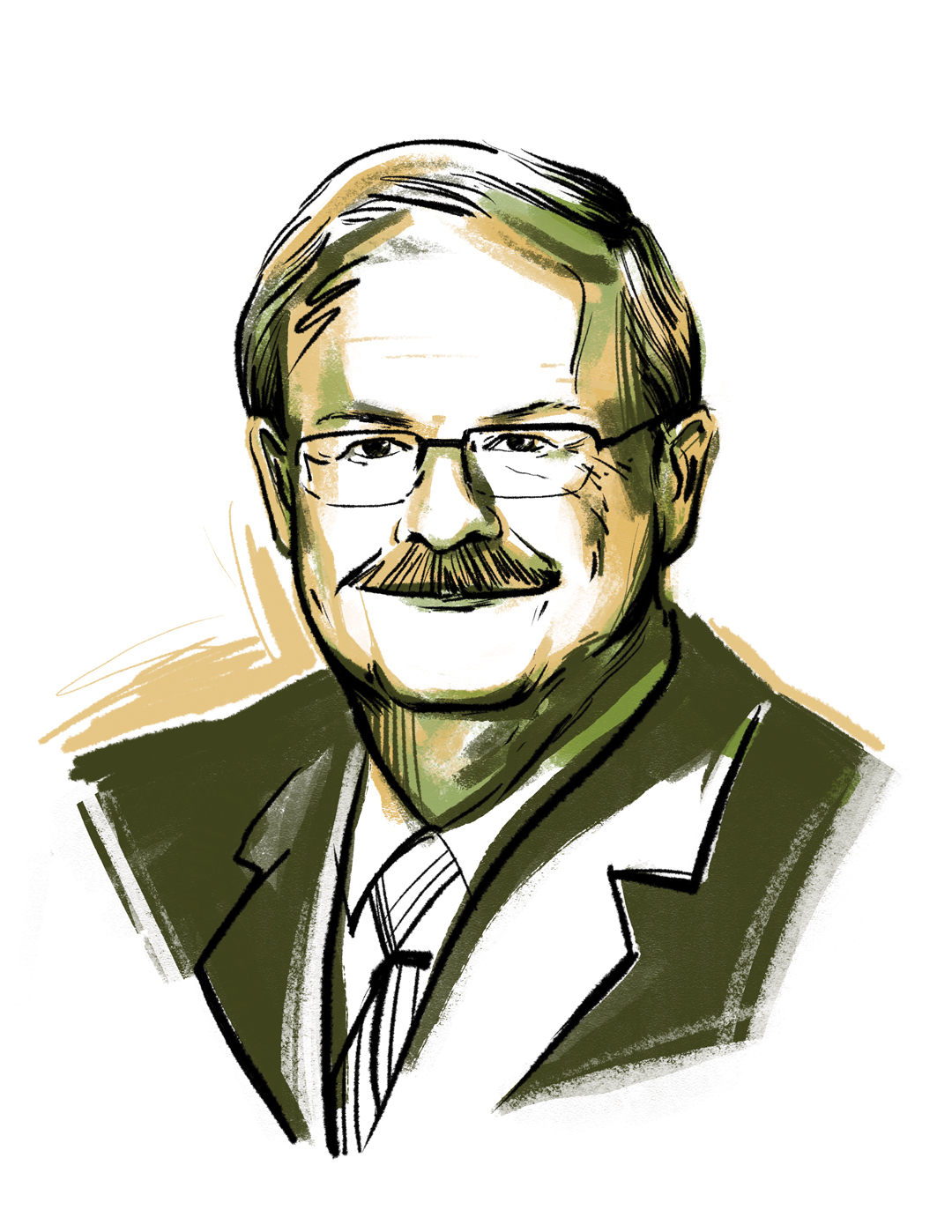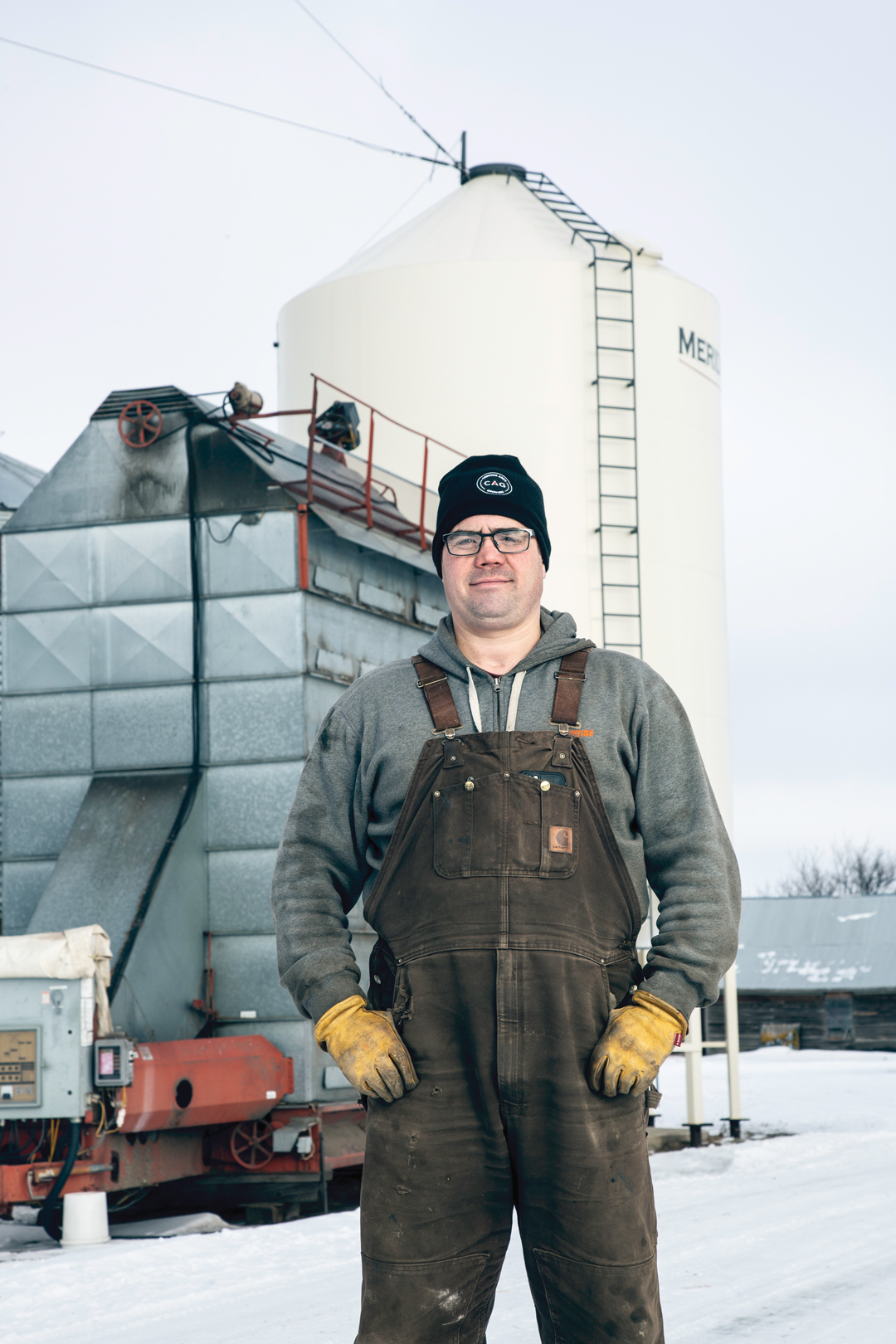THE ADVENTURE OF A LIFETIME
BY ELLEN COTTEE • ILLUSTRATION BY EMILY CHU
Hailing from near the village of Rhein, SK, Art Froehlich’s upbringing in the 1950s and ’60s was modest, but his contribution to agriculture has been substantial and far-reaching. His childhood on the family’s mixed farm was full of fun, family and 4-H competitions. These were years spent learning valuable agricultural knowledge that would serve him well later in life. His subsequent study of soil science at the University of Saskatchewan initiated a lifelong agricultural adventure as an entrepreneur and investor. Known for his role as president of AdFarm during its launch in 2000 and the first thought leader in smart agriculture at Olds College, Froehlich now enjoys his role as a mentor and supporter of agricultural development programs across the world. Awarded both the Alberta Order of Excellence and the Queen’s Platinum Jubilee Medal in 2022 for his contributions to the industry, the farm kid-turned-philanthropist is a committed champion of agriculture.
GrainsWest: How did you know agriculture was the industry for you?
Art Froehlich: When we were growing up, there were only three or four things we really cared about in life. The farm was number 1 from an early age. We [two brothers and two sisters] did everything on the farm with our parents. There was the farm, family and 4-H. From a very early age I knew I was always going to be in agriculture. I was going to farm or do something closely related.
GW: In university, you received a scholarship from a shipping company to study in the U.K. How did that experience shape you?
AF: I was really lucky. I worked on the ship over there, worked on the ship back and worked for three companies while I was there. From that moment on, I knew I was going to work internationally, simply to see the world. That program was really the catalyst to get an 18-year-old kid thinking about the future.
GW: What motivates you to stick with the agriculture industry?
AF: It’s the most fascinating industry in the world. It doesn’t matter where you go in the world. I’ve been fortunate to travel and do business in more than 50 countries. Agriculture is an important industry. We’re feeding people, and what could be better than that?
It’s also exciting. The industry develops and evolves, and it’s a great place for innovation and discovery. The most important thing, though, is the people in agriculture are incredible. Now they face enormous challenges, but they have the innate desire to be the best at what they do. I find that so exciting.
GW: What experience most stands out from your work abroad?
AF: There was a farmer in Mozambique, many, many years ago. He tilled his land with water buffalo. That was the hardest day of labour I’ve ever done in my life. I asked him what he needed to be a better farmer, and he said if he had a wheelbarrow, he could do so much better.
Because of the civil war in Mozambique, he was taking care of his brothers’ two families as they had both been killed. There’s this extended family doing backbreaking labour, and he was a great farmer, but a wheelbarrow would make him that much better. Those kinds of stories I heard travelling the world just make me so enthused about agriculture and farming.
GW: You have worked as Hoechst Canada director of sales and marketing, Alberta Pool general manager and Westcan Malting president. Why did you pivot to investing, entrepreneurship and philanthropy. What inspired you to change course?
AF: It was an evolution. I’ve been very lucky in my career, I’ve had great mentors, worked with great leaders and had some of the best bosses you could ever imagine. They gave me the freedom and flexibility to make mistakes. If you don’t make mistakes, you’re probably not learning.
I was fortunate enough to go to the Wharton School [at the University of Pennsylvania] late in my career for the Advanced Management Program, which was a fascinating time. I learned a lot during that experience. They put you through this battery of tests and the analyst said to me, “You are the most unlikely CEO I’ve ever met. You will only be happy working for yourself or being independent.” I’d been a corporate person all my life, but when I got back from Wharton I resigned. I knew they were right.
GW: Do you have a philosophy that guides your choices in life and business?
AF: It’s very, very simple. One, you got to love what you do. Every morning I get up, I get excited about the people I’m going to be talking to. Two, learn something every day. Talk to someone who is politically different than you are, from a different part of the world with a different viewpoint. Three, make some money. You need to make some money while doing this. About 15 years ago I added a fourth: leave a legacy. That was where I pivoted to not just doing business, but doing things to support and make the world a better place.
GW: Through the Froehlich Family Foundation, you contribute to charitable programs around the world. What programs do you focus on?
AF: Believe me, I’m not a Bill Gates or a Warren Buffett. We’re just a family who does quite well, and there are just some things we wanted to do. When we started to do charitable work, there were two things we decided to focus on: women in agriculture and youth. 4-H is a big part. We support colleges and universities, and we sponsor a lot of young people to attend conferences.
We created the Manchay Gardening School along with the Jack Neufeld Family [Charitable] Foundation in Lima, Peru, about six years ago. Some men go there, but it’s mostly women. We’ve had almost 700 graduates from the school so far. My wife Shirley and I wanted to help the graduates start a home garden, so we fund over 300 acres in the slums around Lima. Every time I get a chance to visit, they get so excited to show me their gardens and their skills. It’s been a wonderful experience.
GW: At home in Canada, you mentor young farm entrepreneurs. Why is this so important to you?
AF: They’re so full of enthusiasm. For an old guy like me to sit down with 20- or 30-somethings and get their view of the world and how they’re going to change it, it’s so amazing.
When I mentor young people, I always tell them, and especially women, join a board. Whether it’s the local school or dance club, 4-H, whatever; serving on a board is a great way to meet people, understand governance and learn how to deal with some difficult issues. That’s one of the reasons we focus on women—they have faced barriers. When you have women at the board table, the dynamic changes for the better. One of the programs we’ve been supporting for years is Advancing Women in Agriculture. It’s just phenomenal to see the representation of women in all areas of agriculture these days.
GW: Looking to the future, what are you most excited about in the world of agriculture?
AF: I’m fascinated with the future of automation. We’re going to see more and more equipment in the fields with automation, and we’ll see artificial intelligence on the farm and in processing. We haven’t even come to grips with the impact these technologies are going to have. The next 10 years are going to be incredibly exciting.







Comments